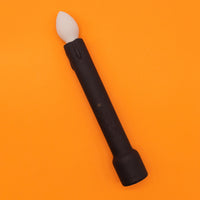Alexandra Fine, Credentialed Sexologist, M. Psych | Written by Dame
We haven’t met you personally, but we’re know that you aren’t really here to search for an actual definition of masturbation. We’re also pretty darned sure that you’ve participated in the activity, at least once or twice.
What you really want, we feel safe in assuming, are answers to some of the common questions that people ask about masturbation:
- Is masturbating normal?
- Is masturbating still normal if you’re in a relationship?
- Is it OK to feel guilty about masturbating?
- Can masturbating cause any medical problems or physical damage?
- Can you masturbate too much?
- Can you become addicted to masturbation?
- Should you avoid masturbating if you’re pregnant?
- Does anything suggest that masturbating is actually good for you?
The overall answer to those questions: masturbation is normal, natural, nothing to feel guilty about, and – in most cases – it shouldn’t cause either shame or medical issues. And yes, some evidence does indicate that self-pleasure can provide health benefits.
(On the off chance you really did come to this page to get a definition of masturbation, here it is, courtesy of dictionary.com:
Masturbation [mas-ter-bey-shuhn]
noun
1. the stimulation or manipulation of one's own genitals, especially to orgasm; sexual self-gratification.
2. the stimulation, by manual or other means exclusive of sexual intercourse, of another's genitals, especially to orgasm.)
That should cover the easy stuff. Let’s get to your questions and go into more details.
Does Everyone Really Masturbate?
We wouldn’t go as far as saying everyone masturbates. There are always a few exceptions to every rule.
Generally speaking, though, the answer is yes. Just about everyone masturbates – because it’s a normal part of human sex life.
Alfred Kinsey’s mid-20th century landmark research of sexual behavior in the United States (which, as you’d expect, dealt with “men” and “women”) was the first important study on the subject. Kinsey found that 92% of men and 62% of women had masturbated at least once in their life.
More recent studies not only confirm the prevalence of self-satisfaction, but show a dramatic increase in the number of vulva-havers who’ve masturbated. A 2008 British research project reported that 95% of men and 71% of women had enjoyed the practice at some point in their lives, and 73% and 37% respectively had masturbated just within the previous month. And the prestigious Merck Manual puts the lifetime numbers even higher, at 97% of “men” and 80% of “women.”
According to conventional wisdom, pre-teens and teens begin discovering their sexuality through masturbation. In reality, it can begin much earlier. There are numerous studies showing that genital play is common well before puberty, and so-called infantile masturbation – often diagnosed as a mental health issue called gratification disorder – can begin as early as two months of age.
One might think that self-gratification becomes less common in adulthood, as people find spouses or permanent sex partners. That’s not really the case. Studies show that American adults masturbate regularly, regardless of their relationship status. The frequency does decline slightly, though; the average is 16 times per month for singles vs. 11 times per month for those who are married or have “permanent” sexual partners.
So yes, virtually everyone masturbates. But that doesn’t mean they’re all proud of that fact.
Masturbation and Guilt
There’s a very long history of religions and societies trying to prohibit or discourage masturbation. Even today, the official position of the Catholic Church and many conservative Protestant denominations is that self-pleasure is a sin, even though there’s a trend within some sects to reinterpret the Biblical passages that had been used to forbid masturbation.
Those “official” prohibitions are one longstanding source of the shame or guilt that many people associate with masturbation. Even more “personal” sources of guilt are common, too, like the lectures condemning sexual activity that so many children hear from their parents. That’s not even mentioning the punishment that sadly may follow parents’ discovery that their child has begun to explore their own body.
Most students, at least in Western nations, learn the truth about normal sexual health and practices in middle school classes. Others figure it out through their sexual experiences as they mature. Even so, the residual guilt and shame attached to masturbation, which may have been imprinted at an early age, can be difficult to completely overcome.
Negative feelings surrounding self-satisfaction may also be reinforced in other ways, once an adult reaches social maturity.
In some cases, people feel that they “shouldn’t have to masturbate” once they’ve gotten married or found regular sex partners. They wrongly assume that being a grown-up means that sexual intercourse or other types of play should provide all of the sexual pleasure they need. As we’ve already discussed, however, statistics show that most happily-partnered adults also satisfy themselves regularly.
In other cases, they may feel shame or a lack of self-esteem if they or their regular partner is also masturbating “on the side.” There can be a sense of guilt that one partner isn’t enough – or good enough – to satisfy the other. Of course, those feelings are quite real even though they’re not grounded in reality. The human sex drive doesn’t automatically turn into a “penetration drive” after marriage, and a person doesn’t only experience sexual arousal when they’re in bed with their partner.
The bottom line: it’s understandable why many people feel guilty about masturbating. Some are able to overcome the guilt over time. Others may benefit from at least a session or two with a sex therapist or LCSW (licensed clinical social worker), who can help them resolve the issue and more fully enjoy the different types of sex play.
Some of the long-standing myths about masturbation which contribute to feelings of guilt, involve alleged health dangers or side effects. Let’s debunk those next.
Can Masturbation Be Bad for You?
In all but the rarest of situations, no.
One of the most common anti-masturbation myths claims that self-pleasuring can, over the long term, cause a permanent decrease in sensitivity in the vagina, clitoris or penis. In other words, too much self-play can supposedly make partner play less enjoyable.
That’s not true. In fact, one study found that vulva-havers who regularly masturbate with vibrators or other sex toys are likely to have better sexual function and a greater ability to reach orgasm. Another study of penis-havers reported similar findings.
A number of other myths center on damage to the genitals that masturbation can allegedly cause. Those dangers supposedly include curvature or shrinkage of the penis, erectile dysfunction, low sperm counts and eventual impotence. There have also been claims throughout history that self-pleasuring can lead to insanity.
None of that, of course, is true. In fact, the genesis of those myths are based, at least in part, in societal efforts to discourage people from masturbating.
Here’s what is true: there are a number of lifestyle and health benefits connected to masturbation.
- Research indicates that regular ejaculation, whether it’s via masturbation or partner play, can dramatically reduce penis owners’ risk of developing prostate cancer.
- Frequent masturbation may increase vulva-havers’ chances of becoming pregnant (by “refreshing” the conditions of their internal reproductive organs and preventing cervical infections), as well as the motility of penis-havers’ sperm (by “flushing” older sperm from the reproductive system).
- Masturbation (and intercourse) work to strengthen pelvic floor muscles, potentially improving sexual health and the ability to frequent sexual activity throughout life. And as light cardiovascular activity, masturbation can also contribute to better heart health.
- The endorphins and other hormones released during orgasm, whether triggered by sex or masturbation, can lower stress, improve mood and encourage healthy sleep.
-
Mutual masturbation, when enjoyed without physical contact, is the best way to engage in sexual play with a partner without any risk of pregnancy, sexually-transmitted infections or diseases. When two partners pleasure each other, the chances of pregnancy, STIs and STDs increase somewhat but are certainly much lower than during penetrative sex.
In either type of mutual masturbation, partners are able to experience a closeness and intimacy which may be even greater than what they feel during traditional penetration – since they’re able to observe (or be told) the exact types of sexual stimulation that’s most likely to satisfy their partner.
There’s a theory claiming that people will be less interested in having sex with their partner if they masturbate regularly. Research has largely debunked that belief; one often-cited study showed that “women who masturbate” were happier in their marriages than those who don’t.
However, that does bring us to one of the few real dangers of masturbation: addiction.
We’re not talking about getting a little too much of a very good thing. For well-adjusted adults, there’s no such thing as “masturbating too much.” But just as with any type of sexual behavior, a small number of people may be prone to developing an addiction to masturbation. Experts classify this as a compulsive sexual behavior, which can lead to the neglect of daily responsibilities, relationships and otherwise normal functioning.
All forms of compulsive sexual behavior are relatively rare, affecting just a few percent of the population. But an addiction to masturbation or any other type of sexual activity should be discussed with a therapist or healthcare professional.
The other potential dangers of masturbation are mostly temporary and easily dealt with. For example, getting a little too energetic with an erect penis (or an unlubricated vagina or anus) can cause chafing, swelling or a decrease in sensitivity. In most cases, it will simply go away in a few days, and can be avoided by regularly changing “techniques.”
Masturbating with dirty sex toys can certainly cause infections or transmit STDs – but being smart and cleaning toys properly will let you avoid those issues. Another uncommon but possible danger comes from masturbating with foreign objects, which can become lodged in the vagina or anus. Generally speaking, any resulting issues can be easily treated in your local emergency room.
A more serious but very rare possibility is Peyronie’s Disease, the development of scar tissue in the penis which can be caused by vigorous sexual activity, including masturbation. (It may also be caused by an accident or sports injury.) PD causes painful erections, but usually goes away on its own in 6-12 months or so. Needless to say, you should always seek medical advice if you suffer painful erections.
The quick summary: as long as you’re careful, masturbation isn’t bad for you in any way. In truth, it’s one of the healthiest things you can do with your clothes off.
Other Questions about Masturbation
That’s pretty much all of the important stuff you need to know, but there are few other questions that people often ask.
Is it OK for pregnant women to masturbate?
Absolutely, unless it’s a high-risk pregnancy, since reaching orgasm can induce labor. Otherwise, masturbation is the easiest and safest way to release the increased sexual tension that’s commonly created by pregnancy-induced hormonal changes. It can also relieve some of the cramping and lower back pain that can accompany pregnancy. Just be aware that climaxing when pregnant can bring on its own temporary, mild cramps.
Why don’t I climax when masturbating?
Unfortunately, masturbation is not a golden ticket to orgasm. Climaxing is more likely during self-pleasure than during penetrative sex, because you’ll know what feels good – and can keep doing it until it pays off. That doesn’t mean there’s a guarantee, though. Experimentation with different techniques or sex toys can help you learn more about your body and what works best for you, allowing you to turn the corner into pleasure town.
Can you masturbate while you’re on your period?
Absolutely, as long as you clean up afterward – and that includes cleaning sex toys, since bacteria love to grow in blood. In fact, Planned Parenthood suggests masturbation as a great way to relieve the cramps that often accompany menstruation.
Why don’t I want to masturbate? Is that normal?
“Normal” is a difficult word to define when discussing sex, since everyone’s needs and desires are different. If you simply don’t enjoy pleasuring yourself and prefer to play with a partner, there’s nothing wrong with that. The only reason for concern could be if your overall sex drive and desire has recently declined, since that could indicate a medical issue which should be discussed with your doctor.




















































